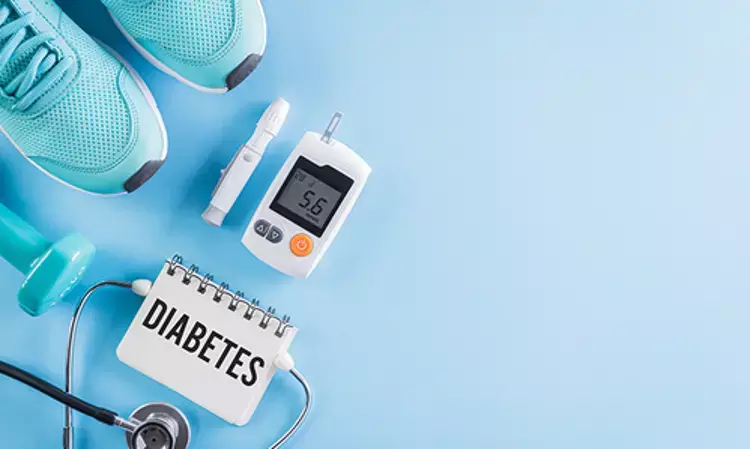- Home
- Medical news & Guidelines
- Anesthesiology
- Cardiology and CTVS
- Critical Care
- Dentistry
- Dermatology
- Diabetes and Endocrinology
- ENT
- Gastroenterology
- Medicine
- Nephrology
- Neurology
- Obstretics-Gynaecology
- Oncology
- Ophthalmology
- Orthopaedics
- Pediatrics-Neonatology
- Psychiatry
- Pulmonology
- Radiology
- Surgery
- Urology
- Laboratory Medicine
- Diet
- Nursing
- Paramedical
- Physiotherapy
- Health news
- Fact Check
- Bone Health Fact Check
- Brain Health Fact Check
- Cancer Related Fact Check
- Child Care Fact Check
- Dental and oral health fact check
- Diabetes and metabolic health fact check
- Diet and Nutrition Fact Check
- Eye and ENT Care Fact Check
- Fitness fact check
- Gut health fact check
- Heart health fact check
- Kidney health fact check
- Medical education fact check
- Men's health fact check
- Respiratory fact check
- Skin and hair care fact check
- Vaccine and Immunization fact check
- Women's health fact check
- AYUSH
- State News
- Andaman and Nicobar Islands
- Andhra Pradesh
- Arunachal Pradesh
- Assam
- Bihar
- Chandigarh
- Chattisgarh
- Dadra and Nagar Haveli
- Daman and Diu
- Delhi
- Goa
- Gujarat
- Haryana
- Himachal Pradesh
- Jammu & Kashmir
- Jharkhand
- Karnataka
- Kerala
- Ladakh
- Lakshadweep
- Madhya Pradesh
- Maharashtra
- Manipur
- Meghalaya
- Mizoram
- Nagaland
- Odisha
- Puducherry
- Punjab
- Rajasthan
- Sikkim
- Tamil Nadu
- Telangana
- Tripura
- Uttar Pradesh
- Uttrakhand
- West Bengal
- Medical Education
- Industry
Low magnesium associated with poor glycemic control and complications in Diabetes patients: Study

Low magnesium associated with poor glycemic control and complications in Diabetes patients suggests a study published in the EJIFCC.
Diabetes mellitus (DM) is a significant and escalating global health concern, with Type 2 DM (T2DM) constituting approximately 90% of all DM cases. Magnesium (Mg) plays a crucial role in various physiological processes. Hypomagnesemia is prevalent in T2DM patients.
The severity of hypomagnesemia correlates with glycemic control and is linked to the development of complications associated with T2DM. The objective of our study was to evaluate the occurrence of hypomagnesemia in patients with T2DM and explore its association with both glycemic control and the development of complications in rural and urban populations.
The study consisted of 300 diabetic and 100 non-diabetic patients between 31 and 55 years of age. Fasting blood glucose, post-prandial blood glucose, and magnesium levels were estimated using a fully automated analyzer, Selectra Pro-XL. HbA1c was measured using Bio-Rad D10. Insulin levels were calculated using the chemiluminescence method. HOMA-IR was also assessed using a formula: fasting insulin (U/mL) multiplied by fasting plasma glucose (FPG) (mmol/L) divided by 22.5.
Result: Magnesium levels were significantly lower in diabetic patients (1.34±0.29) than in the control (2.17±1.87) with p<0.0001. FBS (267.67±89.78 mg/dL vs. 167.87±76.87 mg/dL, p<0.0001), PPBS (376.87±112.87 mg/dL vs. 287.90±99.98 mg/dL, p<0.0001), HbA1c (9.54±2.6 % vs. 7.23±1.8 %, p<0.0001), Insulin (17.21±8.98 IU/mL vs. 14.87±5.98 IU/ mL, p=0.039) and HOMA-IR (7.32±3.67 vs. 6.13±0.99, p=0.012) were significantly elevated in the hypomagnesemia group than the normal magnesium levels. Magnesium levels were negatively correlated with FBS (r=-0.465; p<0.0001), PPBS (r=-0.596; p<0.0001, HbA1c (r=-0.765; p<0.0001), Insulin (r=-0.454; p<0.0001), and HOMA-IR (r=-0.325; p<0.0001).
The study suggests that monitoring serum magnesium levels is crucial for individuals with Type 2 diabetes mellitus (T2DM) to manage hypomagnesemia, mitigate associated complications, and optimize overall care.
Reference:
Ram VS, Vishnoi A, Sharma M, Jaison A, Singh N. Unveiling the Role of Magnesium: Insights into Insulin Resistance and Glycemic Control in Type 2 Diabetes. EJIFCC. 2024;35(3):189-194.
Dr. Shravani Dali has completed her BDS from Pravara institute of medical sciences, loni. Following which she extensively worked in the healthcare sector for 2+ years. She has been actively involved in writing blogs in field of health and wellness. Currently she is pursuing her Masters of public health-health administration from Tata institute of social sciences. She can be contacted at editorial@medicaldialogues.in.
Dr Kamal Kant Kohli-MBBS, DTCD- a chest specialist with more than 30 years of practice and a flair for writing clinical articles, Dr Kamal Kant Kohli joined Medical Dialogues as a Chief Editor of Medical News. Besides writing articles, as an editor, he proofreads and verifies all the medical content published on Medical Dialogues including those coming from journals, studies,medical conferences,guidelines etc. Email: drkohli@medicaldialogues.in. Contact no. 011-43720751


